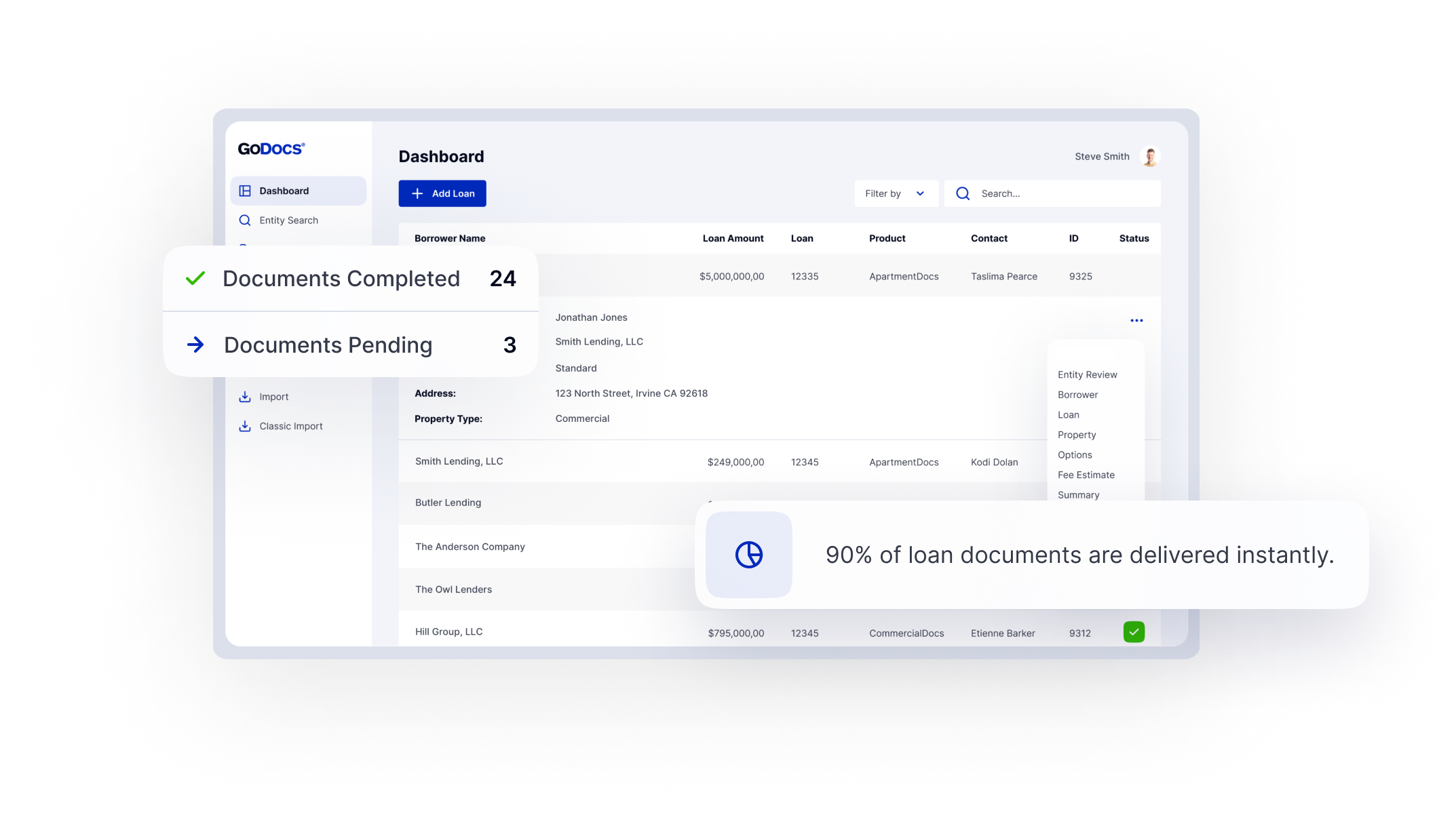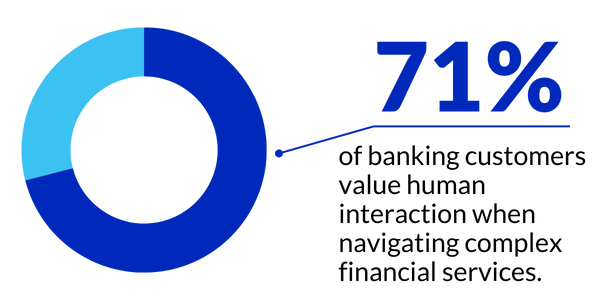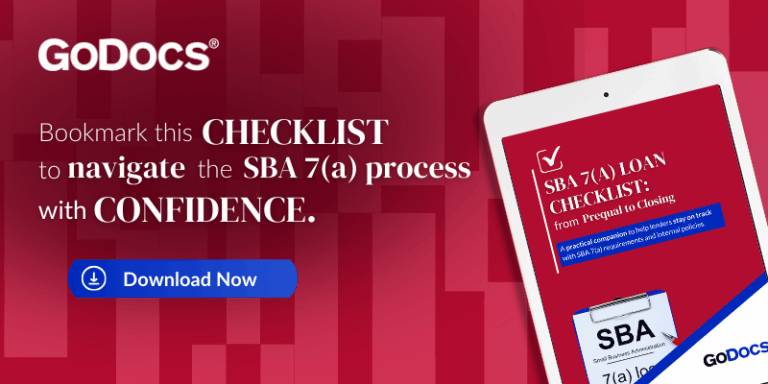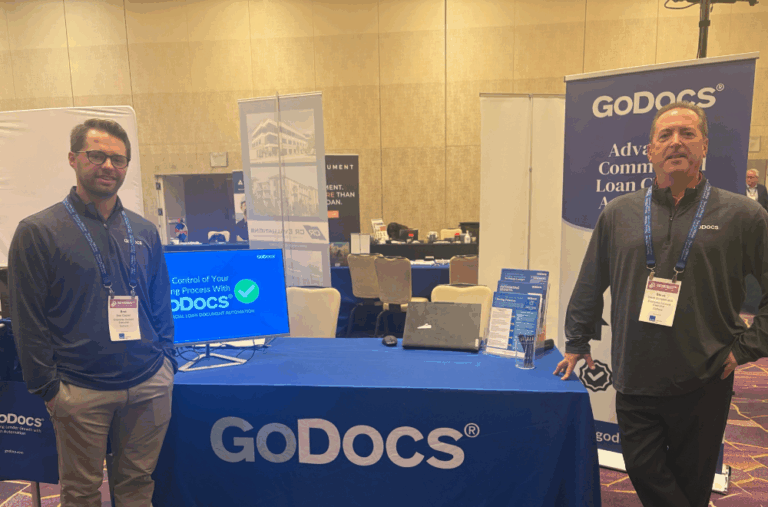Q4 New Product Enhancements Spotlight
Single Sign-On (SSO) – Simplifying Your Access
GoDocs is proud to launch Single Sign-On (SSO), designed to enhance your user experience. With SSO, you can log into our platform using a single set of credentials, eliminating the need to remember multiple usernames and passwords. This feature not only simplifies your login process but also enhances security, making your access to GoDocs faster and safer. Watch our SSO sign-in process videos here.
Master Guaranty – New Product Feature
Introducing the Master Guaranty, our newest addition under the guaranty options. This feature is tailored for Borrowers/Guarantors with a high volume of repeat business with lenders. It allows for a Master Guaranty to be executed separately from the GoDocs system, providing greater flexibility and efficiency for ongoing transactions. This streamlined approach means less repetitive paperwork and more time focusing on what truly matters—your business growth.
C-PACE Loan Information – New Lender Setting for Construction Loans
We now offer a new lender setting that allows you to include C-PACE loan information in your Construction or Construction-Term Combo loans. This addition provides more comprehensive loan management options, ensuring that all relevant financing information is included in your documentation.
Q4 Compliance Update Spotlight
California Assembly Bill 2424
Georgia Guaranty; Inclusion of Waiver of O.C.G.A. Sect. 44-16-161
Under Georgia law, lenders can foreclose on a property without a court order. However, if the lender wants to pursue a deficiency judgment (the difference between what’s still owed on the loan and the foreclosure sale price), they must follow a special procedure. Specifically, they have to report the foreclosure sale to the Superior Court in the county where the property is located and get the court’s approval.
If the lender doesn’t follow this step, a guarantor can use this as a defense to avoid paying the deficiency. This could leave the lender unable to recover the remaining balance owed after foreclosure.
To avoid this issue, it’s important for guaranty agreements in Georgia to include a waiver clause. This clause should state that the guarantor gives up their right to use the lender’s failure to comply with Georgia’s reporting and approval requirement (under O.C.G.A. § 44-14-161) as a defense.
By including this waiver, lenders can protect their ability to recover deficiencies from guarantors, even if they accidentally skip the court confirmation step.
Hawaii; Inclusion of Mortgagor Marital Recitation (Married or Unmarried)
Non-Signing Spousal Signature Block: Similar to other states, Hawaii requires inclusion of the marital status of the borrower/mortgagor in the security instrument even when the borrower/mortgagor is single, as well as the spouse of borrower/mortgagor to sign a non-signing spousal signature block in the security instrument in order for the spouse to subject his/her potential elective share interest in the property to the lender’s lien.
GoDocs News
Numerated and GoDocs Collaborate to Accelerate the Commercial Lending Process
GoDocs is excited to announce a strategic partnership with Numerated, an AI-driven commercial lending platform, to streamline and automate the loan documentation process for financial institutions. By integrating GoDocs’s advanced document automation solutions into Numerated’s platform, lenders can prepare and execute loan documents faster, more securely, and with greater accuracy.
This collaboration enhances Numerated’s comprehensive ecosystem of partners while reinforcing GoDocs’s commitment to transforming the commercial lending process with innovative, scalable technology.
About Numerated
Numerated is an AI-driven platform that transforms how financial institutions lend to businesses. By leveraging advanced data and AI, Numerated automates every step of the lending process, providing lenders with industry-leading efficiency gains. Learn more at https://www.numerated.com.
Upcoming Product Enhancements
Non-Standard Vesting
Enhancements to our Non-Standard Vesting scenarios to automate support of additional scenarios for CRE and C&I.
API Documentation
Enhancements to our API documentation to better support and maintain integrations with customers who use our JSON Push, Single Sign-on, or embedded integration services.
Did You Know?
Did you know GoDocs has a new Customer Success Manager?
We are so excited to have our new Customer Success Manager, Laura Hatcher, on the team. Laura works with all the GoDocs teams, including support, product, and legal to ensure we are maximizing our partnerships with you to exceed your tactical and strategic needs. Let her help you take your GoDocs experience to the next level! Reach out to her at: [email protected] to start a conversation!
Order Ancillary Documents Separately
Did you know that you can now order some of our popular ancillary documents, such as SNDAs and ACH forms, separately from your main closing package? This flexibility gives you greater control over your closing process. For example, you can download pre-closing documents in advance to prepare for your closing table or order post-closing documents as needed. The benefit of this feature is (a) increased efficiency: download documents when it suits your workflow and (b) cost-effectiveness: order only the documents you need when you need them.
Add a Third-Party Authorization Form to Your Package
We understand the importance of protecting borrower information while also facilitating necessary communication with third parties. That’s why we’ve introduced the ability to add a Third-Party Authorization Form to your closing package. This form allows you to obtain the borrower’s explicit consent to share their confidential information with third parties, such as investors, rating agencies, title agents, attorneys, or contractors.
Want to learn more about these features?
Contact our customer support team ([email protected]) today! We’re happy to answer any questions.
GoDocs Leadership Insights
California Lenders: Be Ready for New Foreclosure Laws
California Assembly Bill 2424
by Tucker Wade
This past September, California Assembly Bill 2424 was signed into law, introducing important changes to the state’s foreclosure rules. Starting January 1, 2025, the new law will amend and supplement existing foreclosure requirements for mortgage loans, including for loans secured by residential 1-4 unit properties. The goal of the law is straightforward: to provide mortgagors with more time and protections to help prevent foreclosure.
One of the key changes for loans secured by a residential 1-4 unit property is that lenders must now provide mortgagors with a written disclosure explaining that a third party (such as a family member, attorney, or a U.S. Department of Housing and Urban Development-certified housing counselor) may record a request to receive copies of certain foreclosure-related notices, specifically notices of default and sale. This notice must be given to the mortgagor before they sign the deed of trust.
What does this mean for commercial lenders?
The new law applies to both residential and commercial (business-purpose) mortgage loans. This means commercial lenders must follow the updated rules, both during the foreclosure process (e.g., the timing of the foreclosure sale and sale price limitations imposed on the trustee) and at the time of closing. For example, the required mortgagor notice must be provided at the right time, as specified in the law.
Lenders should work with their legal counsel, mortgage servicers, and trustees to understand how these changes affect their foreclosure practices and ensure that their loan documents include the new disclosure requirements when applicable.
At GoDocs, we believe best-in-class, attorney-driven commercial loan documents, and their 50-state legal compliance are not mutually exclusive. Our customers can rest assured that our California loan documents will continue to be legally compliant, including with these new requirements.
Compliance with Corporate Transparency Act
by Zach Wallin
The Corporate Transparency Act (CTA) is an anti-money laundering law that establishes beneficial ownership information reporting requirements and requires the United States Department of Treasury’s Financial Crimes Enforcement Network (FinCEN) to implement the CTA. The CTA requires all non-exempt companies formed or registered in the United States to report certain company and beneficial ownership information to FinCEN or face potential penalties of up to $10,000.
On December 3, 2024, a Federal District Court in Texas ruled that enforcement of the CTA and its implementing regulations was unconstitutional. As of the publishing of this article, the 5th Circuit Court of Appeals has upheld the lower court’s ruling, and as a result, no filings under the CTA are currently required by law, and companies do not need to report their beneficial ownership information. This current status is subject to change, however, and because of that, we are providing the information below to give you the necessary information when and if it is needed.
If the requirement to file a Beneficial Ownership Information Report (BOIR) is reinstated, each business owner will need to determine (1) if it is a reporting company, and (2) what information it needs to collect and report to FinCEN. A reporting company is any company formed in the United States or any foreign company that registers to do business in the United States unless it comes within the scope of an exemption. There are 23 categories of exemptions, and each reporting company should determine if an exemption applies to its particular situation.
Once a company determines it is required to report to FinCEN under the CTA, then the beneficial owners must be identified. An individual can be a beneficial owner by either or both of the following: (i) having an ownership interest in a reporting company or (ii) the exercise of substantial control over a reporting company. An ownership interest is defined as an individual who owns or controls at least 25% of the ownership interests of a reporting company. Individuals who directly or indirectly exercises substantial control over a reporting company are potentially senior officers of the company (President, CEO, CFO, General Counsel), an individual who has authority to unilaterally appoint or remove any such senior officer or a majority of the board of directors of the reporting company, the individual directs, determines or has substantial influence over important decisions made by the reporting company (regarding business, finances, or structure), or the individual has any other form of substantial control over the reporting company.
It is important to note that beneficial owners can only be individuals. Another entity cannot be a beneficial owner of a reporting company. FinCEN’s view is that every reporting company must have at least one beneficial owner.
Reporting companies need to gather all applicable information (Company information, Beneficial Owner information), complete the BOIR via pdf or the online portal at https://boiefiling.fincen.gov/, and Submit the BOIR to FinCEN by January 13, 2025.
Once the BOIR is submitted, there is no continued filing requirement if the information remains the same. A reporting company will only need to update its BOIR if/when the information submitted changes.
Q4 Additional Product Enhancements
- CRE – Third-Party Fee Owner (TPFO)
- Refinements made to the TPFO templates to increase the standardization of this vesting scenario.
- C&I – DACA
- An enhancement that now includes the option for digital signatures of the Deposit Account and Control Agreement (“DACA”).
- Global – UCC Debtor Exhibits
- A refinement to the “Financing Statement; Exhibit A” to list all individual Debtors.
- Global – Partial Release
- Update to the partial release language to make the language more reader-friendly.
- Global – Actual Per Diem
- Removed the rounding of decimals for the Actual Per Diem Interest data field of the Funding page.
- Global – Lender Closing Instructions
- A refinement to the Lender Closing Instructions templates to make the language more reader-friendly.
- CRE – Non-Standard Vesting
- Updates made to the ancillary documents to capture necessary edits that capture the vesting scenario of “Upon closing the property will be owned by” = Third-Party Fee Owner.
- Global – New Lender Setting
- Photo inspections were added as another Lender right to the ConstructionDocs offering. Among Lender’s other rights, Lender may conduct such inspections periodically in conjunction with a disbursement request of Loan funds, or on a stand-alone basis, to validate the progress of construction.
- C&I – Guarantor Address
- New Lender setting under the C&I product that allows the user to enter a separate address from the Borrower for Guarantor(s) of the loan.
- Global – Borrower Affiliate
- New Lender setting that allows the user the option to Remove Borrower Affiliate Acceleration Event of Default language in the loan documents.
- CRE – FL Recordable Docs
- New Lender setting that allows the user to omit the inclusion of witness information from the FL recordable documents.
- CRE – Cover Page Refinement
- Refinements made to Recorded Cover Pages to bring in the Lender’s Main Address rather than the Lender’s Return Address for the following states: Wisconsin, Oregon, Missouri, Georgia, and Kansas.
- C&I – LOC/RLOC
- GoDocs has made significant progress with the UI components of exciting new product(s): Line of Credit and Revolving Line of Credit to Term Loan. The new products are one step closer to being available for customer use.
- Transition in Texas Counsel at GoDocs
- After many years of dedicated service, our esteemed Texas Counsel, Paul Kellogg, will be retiring. Paul has been an integral part of our company, and his expertise and commitment have greatly contributed to the success of GoDocs. As we bid farewell to Paul, we are pleased to announce that his colleague Louis Rossitto will be taking over as our Texas Counsel. Louis has been with GoDocs for several years and brings a wealth of experience and a deep understanding of our documents and processes. Louis is committed to maintaining the high standards of service that you have come to expect from GoDocs.
Q4 All Compliance Updates
- CRE – Tennessee Updates
- Compliance enhancements to (i) the Deed of Trust and UCC1 for loans with a property state of Tennessee and (ii) compliance enhancements to the UCC1 If the Borrower(s) is an individual who lives in Tennessee or an entity whose formation state is Tennessee. Please refer to this link in the GoDocs Knowledge Base for further details on the change.
- CRE – SNDA’S
- Refinements made to the SNDA options that are recorded in Florida, Minnesota, and Nevada.
- Construction / Lines of Credit Loans – Securitization Provisions
- Compliance enhancements to the “Disclosure of Information” which expands protections to carry out such loan transfers to an investment pool providing the collateral for the securitized group of loans.
- CRE – Delaware
- Compliance update to Sussex County recordable documents.
- CRE – Global MERS Compliance
- Compliance updates to Indiana, Mississippi, New York, and Pennsylvania security instruments when the user selects “Include MERS” for an order.
- CRE – Compliance Hawaii
- Compliance enhancements to include non-signing spousal signature block at the end of Hawaii Mortgages/ Guaranty when the borrower is an individual.
- CRE – Compliance California
- Compliance enhancements to include the following: (i) the addition of a “Notice to Mortgagor” document, (i) the addition of a separate “Request for Copy of Notice of Default (Mortgagor Copy), and (iii) Enhancements to California Deed of Trust “Acceleration; Remedies” Section.
- Global – Hawaii Compliance
- Compliance enhancements to our Hawaii Mortgages and Assignment of Leases and Rents to include the mortgagor’s marital status for Individual Borrower/Mortgagors.








